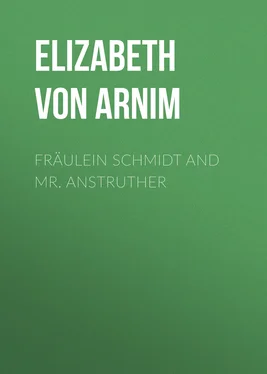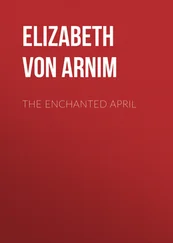Elizabeth von Arnim - Fräulein Schmidt and Mr. Anstruther
Здесь есть возможность читать онлайн «Elizabeth von Arnim - Fräulein Schmidt and Mr. Anstruther» — ознакомительный отрывок электронной книги совершенно бесплатно, а после прочтения отрывка купить полную версию. В некоторых случаях можно слушать аудио, скачать через торрент в формате fb2 и присутствует краткое содержание. Жанр: Фантастические любовные романы, foreign_antique, foreign_prose, Зарубежные любовные романы, на английском языке. Описание произведения, (предисловие) а так же отзывы посетителей доступны на портале библиотеки ЛибКат.
- Название:Fräulein Schmidt and Mr. Anstruther
- Автор:
- Жанр:
- Год:неизвестен
- ISBN:нет данных
- Рейтинг книги:3 / 5. Голосов: 1
-
Избранное:Добавить в избранное
- Отзывы:
-
Ваша оценка:
- 60
- 1
- 2
- 3
- 4
- 5
Fräulein Schmidt and Mr. Anstruther: краткое содержание, описание и аннотация
Предлагаем к чтению аннотацию, описание, краткое содержание или предисловие (зависит от того, что написал сам автор книги «Fräulein Schmidt and Mr. Anstruther»). Если вы не нашли необходимую информацию о книге — напишите в комментариях, мы постараемся отыскать её.
Fräulein Schmidt and Mr. Anstruther — читать онлайн ознакомительный отрывок
Ниже представлен текст книги, разбитый по страницам. Система сохранения места последней прочитанной страницы, позволяет с удобством читать онлайн бесплатно книгу «Fräulein Schmidt and Mr. Anstruther», без необходимости каждый раз заново искать на чём Вы остановились. Поставьте закладку, и сможете в любой момент перейти на страницу, на которой закончили чтение.
Интервал:
Закладка:
Now I am going to bed,—to dream of you, I suppose, considering that all day long I am thinking of you; and perhaps I shall have a little luck, and dream that I hear you speaking. You know, Roger, I love you for all sorts of queer and apparently inadequate reasons—I won't tell you what they are, for they are quite absurd; things that have to do with eyebrows, and the shape of hands, so you see quite foolish things—but most of all I love you for your voice. A beautiful speaking voice is one of the best of the gifts of the gods. It is so rare; and it is so irresistible. Papa says heaps of nice poetic things, but then the darling pipes. The most eloquent lecturer we have here does all his eloquence, which is really very great read afterward in print, in a voice of beer, loose, throaty, reminiscent of barrels. Not one of the preachers who come to the University chapel has a voice that does not spoil the merit there may be in what he says. Sometimes I think that if a man with the right voice were to get up in that pulpit and just say, 'Children, Christ died for you,'—oh, then I think that all I have and am, body, mind, soul, would be struck into one great passion of gratefulness and love, and that I would fall conquered on my face before the Cross on the altar, and cry and cry....
XIV
The last post has been. No letter. If you had posted it in London on Saturday after the examination I ought to have had it by now. I am tortured by the fear that something has happened to you. Such dreadful things do happen. Those great, blundering, blind fists of Fate, laying about in mechanical cruelty, crushing the most precious lives as indifferently as we crush an ant in an afternoon walk, how they terrify me. All day I have been seeing foolish, horrible pictures—your train to London smashing up, your cab coming to grief—the thousand things that might so easily happen really doing it at last. I sent my two letters to Jermyn Street, supposing you would have left Clinches, but now somehow I don't think you did leave it, but went up from there for the exam. Do you know it is three days since I heard from you? That wouldn't matter so much—for I am determined never to bother you to write, I am determined I will never be an exacting woman—if it were not for the all-important examination. You said that if you passed it well and got a good place in the Foreign Office you would feel justified in telling your father about us. That means that we would be openly engaged. Not that I care for that, or want it except as the next step to our meeting again. It is clear that we cannot meet again till our engagement is known. Even if you could get away and come over for a few days I would not see you. I will not be kissed behind doors. These things are too wonderful to be handled after the manner of kitchen-maids. I am willing to be as silent as the grave for as long as you choose, but so long as I am silent we shall not meet. I tell you I am incurably honest. I cannot bear to lie. And even these letters, this perpetual writing when no one is likely to look, this perpetual watching for the postman so that no one will be likely to see, does not make me love myself any better. It is true I need not have watched quite so carefully lately, need I? Oh Roger, why don't you write? What has happened? Think of my wretched plight if you are ill. Just left to wonder at the silence, to gnaw away at my miserable heart. Or, if some one took pity on me and sent me word,—your servant, or the doctor, or the kind Nancy—what could I do even then but still sit here and wait? How could I, a person of whom nobody has heard, go to you? It seems to me that the whole world has a right to be with you, to know about you, except myself. I cannot wait for the next post. The waiting for these posts makes me feel physically sick. If the man is a little late, what torments I suffer lest he should not be coming at all. Then I hear him trudging up the stairs. I fly to the door, absolutely vainly trying to choke down hope. 'There will be no letter, no letter, no letter,' I keep on crying to my thumping heart so that the disappointment shall not be quite so bitter; and it takes no notice, but thumps back wildly, 'Oh, there will, there will.' And what the man gives me is a circular for Papa.
It is quite absurd, madly absurd, the anguish I feel when that happens. My one wish, my only wish, as I creep back again down the passage to my work, is that I could go to sleep, and sleep and sleep and forget that I have ever hoped for anything; sleep for years, and wake up quiet and old, with all these passionate, tearing feelings gone from me for ever.
XV
Last night I got your letter written on Sunday at Clinches, a place from which letters do not seem to depart easily. My knowledge of England's geography is limited, so how could I guess that it was so easy to go up to London from there for the exam, and back again the same day? As you had no time, you say, to go to Jermyn Street, I suppose the two letters I sent there will be forwarded to you. If they are not it does not matter. They were only a string of little trivial things that would look really quite too little and trivial to be worth reading in the magnificence of Clinches. I am glad you are well; glad you are happy; glad you feel you did not do badly on Saturday. It is a good thing to be well and happy and satisfied, and a pleasant thing to have found a friend who takes so much interest in you, and to whom you can tell your most sacred thoughts: doubly pleasant, of course, when the friend chances to be a woman, and she is pretty, and young, and rich, and everything else that is suitable and desirable. The world is an amusing place. My step-mother talked of you this morning at breakfast. She was, it seems, in a prophetic mood. She shook her head after the manner of the more gloomy of the prophets, and hoped you would steer clear of entanglements.
'And why should he not, meine Liebste ?' inquired Papa.
'Not for nothing has he got that mouth, Ferdinand,' answered she.
ROSE-MARIE SCHMIDT.
XVI
My darling, forgive me. If I could only get it back! I who hate unreasonableness, who hate bitterness, who hate exacting women, petty women, jealous women, to write a thing so angry. How horrible this letter-writing is. If I had said all that to you in a sudden flare of wrath I would have been sorry so immediately, and at once have made everything fair and sweet again with a kiss. And I never would have got beyond the first words, never have reached my step-mother's silly and rude remarks, never have dreamed of repeating the unkind, unjust things. Now, Roger, listen to me: my faith in you is perfect, my love for you is perfect, but I am so undisciplined, so new to love, that you must be patient, you must be ready to forgive easily for a little while, till I have had time to grow wise. Just think, when you feel irritated, of the circumstances of my life. Everything has come so easily, so naturally to you. But I have been always poor, always second-rate—oh, it's true—shut out from the best things and people, lonely because the society I could have was too little worth having, and the society I would have liked didn't want me. How could it? It never came our way, never even knew we were there. I have had a shabby, restricted, incomplete life; I mean the last ten years of it, since my father married again. Before that, if the shabbiness was there I did not see it; there seemed to be sunshine every day, and room to breathe, and laughter enough; but then I was a child, and saw sunshine everywhere. Is there not much excuse for some one who has found a treasure, some one till then very needy, if his anxiety lest he should be robbed makes him—irritable? You see, I put it mildly. I know very well that irritable isn't the right word. I know very well what are the right words, and how horrid they are, and how much ashamed I am of their bitter truth. Pity me. A person so unbalanced, so stripped of all self-control that she writes things she knows must hurt to the being she loves so utterly, does deserve pity from better, serener natures. I do not understand you yet. I do not understand the ways yet of people who live as you do. I am socially inferior, and therefore sensitive and suspicious. I am groping about, and am so blind that only sometimes can I dimly feel how dark it really is. I have built up a set of ideals about love and lovers, absurd crude things, clumsy fabrics suited to the conditions of Rauchgasse, and the first time you do not exactly fit them I am desperately certain that the world is coming to an end. But how hopeless it is, this trying to explain, this trying to undo. How shall I live till you write that you do still love me?
Читать дальшеИнтервал:
Закладка:
Похожие книги на «Fräulein Schmidt and Mr. Anstruther»
Представляем Вашему вниманию похожие книги на «Fräulein Schmidt and Mr. Anstruther» списком для выбора. Мы отобрали схожую по названию и смыслу литературу в надежде предоставить читателям больше вариантов отыскать новые, интересные, ещё непрочитанные произведения.
Обсуждение, отзывы о книге «Fräulein Schmidt and Mr. Anstruther» и просто собственные мнения читателей. Оставьте ваши комментарии, напишите, что Вы думаете о произведении, его смысле или главных героях. Укажите что конкретно понравилось, а что нет, и почему Вы так считаете.












